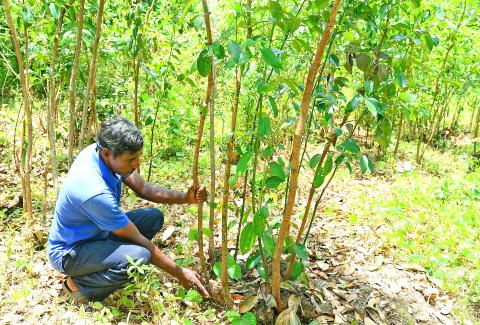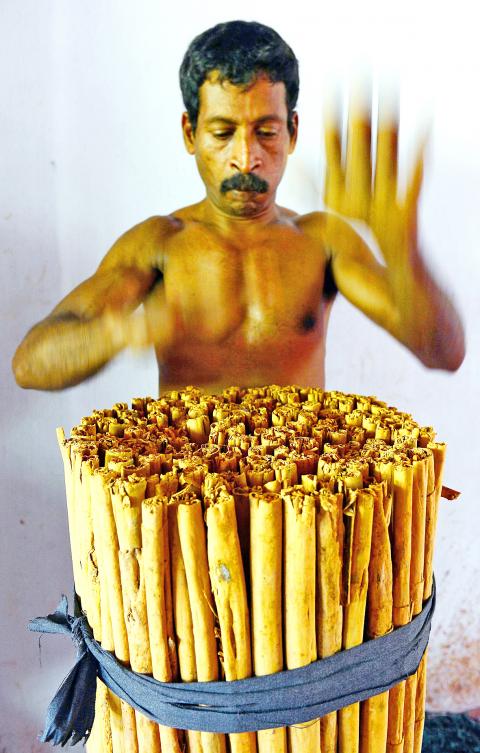Ten years after the Asian tsunami devastated Sarath Kumara’s cinnamon plantation in Sri Lanka, forcing him to start over with nothing, the farmer faces a new threat from further afield.
Sri Lanka is the world’s leading cinnamon supplier thanks to its centuries-old industry, whose lush, green plantations are strung along the island’s southern coast where European colonists and Arab traders once flocked.
However, the industry says its product — known the world over as “Ceylon cinnamon” — is being undermined by a cheaper rival called “cassia cinnamon” grown mostly in China, Southeast Asia and neighboring India.

Photo: AFP
“It took about four years before I could get any crops from new trees and it is only now they are giving a full yield,” Kumara, 54, said at his ancestral farm in Hikkaduwa, 100km south of Colombo. “I have not seen cassia, but we know that some people [abroad] adulterate our cinnamon with cassia or sell cassia as Ceylon cinnamon.”
Kumara lost a brother and a sister-in-law, while half of his 9,000 trees were uprooted, when walls of water destroyed plantations in the 2004 tsunami and left 31,000 people dead and a million homeless across the country.
The industry eventually recovered to become stronger than ever thanks to international donors and a herculean effort by its farmers who replanted half a million cinnamon trees in Hikkaduwa and adjoining Balapitiya area.

Photo: AFP
With cinnamon prices now soaring, the Sri Lankan industry fears wholesalers will increasingly turn to the cheaper product, which is darker in color and according to purists leaves a bitter aftertaste — but still label it “Ceylon cinnamon” or simply cinnamon.
The Spice Council of Sri Lanka wants to protect the brand “Ceylon cinnamon,” and has approached the WTO and the EU about gaining copyright or a patent.
“In many Western countries, cassia is passed off as Ceylon cinnamon [in supermarkets and other shops],” council head Sarada de Silva said. “The true cinnamon is Ceylon cinnamon.”
The council wants the WTO to declare “Celyon cinnamon” a specific product based on a “geographical indication” along the same lines as Champagne, which comes from the region with the same name in northern France.
Under Portuguese, Dutch and finally British colonial rule from the 1500s, the Indian Ocean island was called Celyon and switched to Sri Lanka upon becoming a republic in 1972.
The aromatic spice — used in savory dishes and desserts — grew naturally in Sri Lanka for centuries before Dutch invaders started commercial crops in the 17th century. Sri Lanka’s industry, which supplies 80 percent of the world market, is enjoying record export earnings for the island. High-grade cinnamon oil, extracted from the bark, has been fetching up to 65,000 rupees (US$510) a kilogram.
Cinnamon earned Sri Lanka a record US$135 million from 13,866 tonnes exported last year compared with US$47 million from 12,000 tonnes in 2005, with Mexico, Colombia, Peru and the US the major buyers.
“Prices have never been so good,” De Silva said. “The challenge is to get our geographical indication recognized [by the WTO and others]. That is the best way to deal with cassia.”
The tsunami tragedy pushed devastated cinnamon farmers to invest in better technology upon rebuilding their farms and oil mills and are now reaping the rewards.
“After replanting, it took me four years to make money again,” said farmer Upul Asanka, who lost his farm in the tsunami.
“Initially there was salinity in the soil, but it is better now,” the 38-year-old said.
Kumara said he harvests his 9,000 trees every eight months, compared with every 18 months before the tragedy.
“Since the tsunami our agricultural practice has improved,” Kumara said.
“I notice that the replanted trees give a better crop,” he added.
Improved productivity has also allowed farmers to produce more of the lower-grade oil extracted from cinnamon tree leaves for use in balms, disinfectants, detergents and soap. The more expensive bark oil, meanwhile, is being sold for addition to high-end perfumes and even fizzy drinks.
The council has commissioned a study into the perceived health effects of cinnamon, which some have long claimed lowers blood sugar levels and cholesterol.
Chef Dell’Ascenza Riccardo of Sri Lanka’s biggest luxury hotel chain, also known as “Cinnamon,” said he has started using the famed local product in his Italian dishes.
“I use it for my red wine sauce and many other dishes,” Riccardo said. “The diners feel something different and it makes a good impression.”

To many, Tatu City on the outskirts of Nairobi looks like a success. The first city entirely built by a private company to be operational in east Africa, with about 25,000 people living and working there, it accounts for about two-thirds of all foreign investment in Kenya. Its low-tax status has attracted more than 100 businesses including Heineken, coffee brand Dormans, and the biggest call-center and cold-chain transport firms in the region. However, to some local politicians, Tatu City has looked more like a target for extortion. A parade of governors have demanded land worth millions of dollars in exchange

Hong Kong authorities ramped up sales of the local dollar as the greenback’s slide threatened the foreign-exchange peg. The Hong Kong Monetary Authority (HKMA) sold a record HK$60.5 billion (US$7.8 billion) of the city’s currency, according to an alert sent on its Bloomberg page yesterday in Asia, after it tested the upper end of its trading band. That added to the HK$56.1 billion of sales versus the greenback since Friday. The rapid intervention signals efforts from the city’s authorities to limit the local currency’s moves within its HK$7.75 to HK$7.85 per US dollar trading band. Heavy sales of the local dollar by

Taiwan Semiconductor Manufacturing Co’s (TSMC, 台積電) revenue jumped 48 percent last month, underscoring how electronics firms scrambled to acquire essential components before global tariffs took effect. The main chipmaker for Apple Inc and Nvidia Corp reported monthly sales of NT$349.6 billion (US$11.6 billion). That compares with the average analysts’ estimate for a 38 percent rise in second-quarter revenue. US President Donald Trump’s trade war is prompting economists to retool GDP forecasts worldwide, casting doubt over the outlook for everything from iPhone demand to computing and datacenter construction. However, TSMC — a barometer for global tech spending given its central role in the

An Indonesian animated movie is smashing regional box office records and could be set for wider success as it prepares to open beyond the Southeast Asian archipelago’s silver screens. Jumbo — a film based on the adventures of main character, Don, a large orphaned Indonesian boy facing bullying at school — last month became the highest-grossing Southeast Asian animated film, raking in more than US$8 million. Released at the end of March to coincide with the Eid holidays after the Islamic fasting month of Ramadan, the movie has hit 8 million ticket sales, the third-highest in Indonesian cinema history, Film